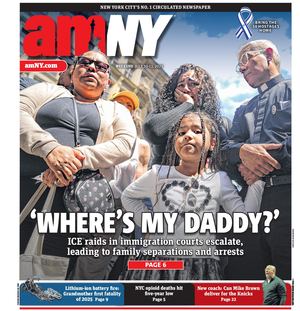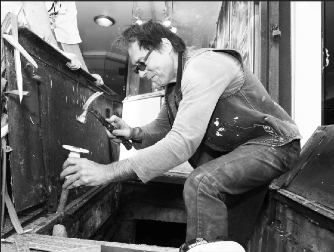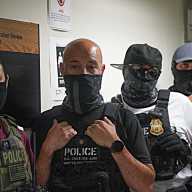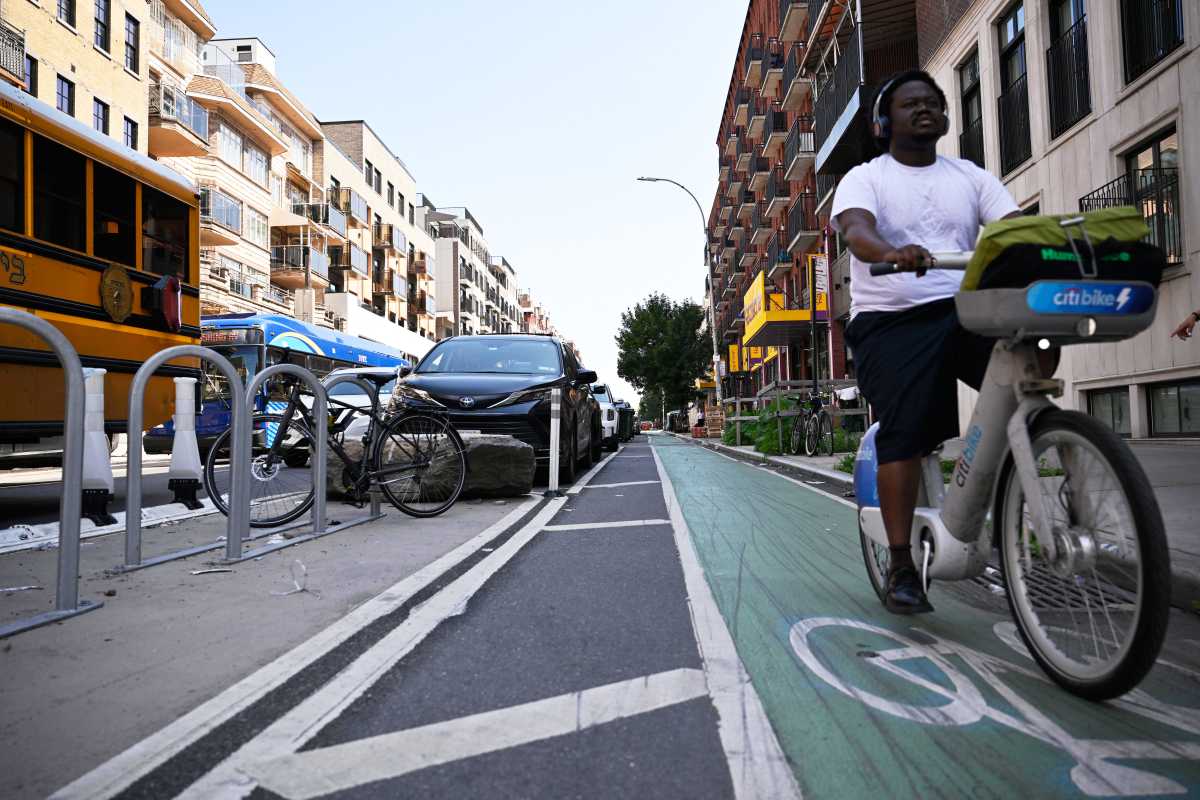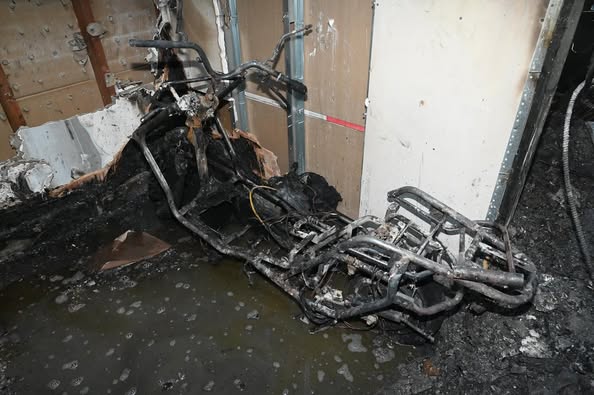By Mary Reinholz
After months of declining to comment publicly about his diminished ministry at St. Mark’s Church-in-the-Bowery, Father Frank Morales, a well-known “squatter priest” active in radical causes, has acknowledged receiving a letter from the Right Reverend Mark S. Sisk, Episcopal bishop of New York, telling him he is persona non grata at the venerable house of worship at E. 10th St. and Second Ave.
During an interview at a nearby coffee shop, Morales, 59, a leader in the controversial 9/11 Truth movement, said Sisk’s letter told him to abide by his decision to resign as an unpaid associate pastor earlier this year and to have “no further involvement” at St. Mark’s, an East Village landmark and longtime gathering place for Downtown activists. Morales did not bring along the bishop’s letter, but summarized its contents.
St. Mark’s, founded in 1799, is famous for its embrace of cutting-edge arts, politics and outreach programs in the community. Tattooed punks and anarchists with spiked hair and pierced skin can be seen sitting on the grounds and inspecting graves. The late beatnik bard Allen Ginsberg once presided over the church’s annual New Year’s reading marathons at its Poetry Project.
The church has been Morales’s spiritual home and center for organizing activities since the mid-1970s when he joined a group of Christian Socialists there. He became an associate pastor in 2001 when Reverend Julio Torres was rector. Morales said that, after Torres left in 2006, he worked “9 to 9” as a kind of ad hoc pastor on a daily basis, sometimes receiving a small stipend from the church’s vestry. But when the vestry appeared to be passing him over for a second time to become a paid priest in charge, Morales said he distributed an “informal” resignation letter early this year to the congregation. He has maintained a tenuous association with St. Mark’s since then.
“The letter from the bishop came to me out of the blue” sometime in July, Morales said, noting he had only recently been discussing fundraising projects for the church with Cynthia R. Copeland, who heads St. Mark’s 12-member governing vestry. “The vestry didn’t know about it. And apparently there is no alternative plan for me,” he added. The bishop, Morales said, proposed in his letter a meeting in late September to discuss options, but no meeting has taken place thus far. “They haven’t contacted me and they won’t,” Morales said. “It’s a lot of double talk. And it was a bit upsetting to me because I took Sisk at his word that there would be a meeting.”
Morales believes Sisk sent him walking papers in part because of the impending arrival of a new priest in charge, whose tenure at St. Mark’s turned out to be unusually brief. The bishop and others “just don’t want me around,” he said.
An enigmatic figure, the lean, black-clad priest with a tiny, silver goatee lives in an E. 10th St. squat and takes odd jobs in construction to make ends meet.
Tina Donovan, a spokesperson for the New York Diocese, said the bishop would have no comment on the letter he sent Morales because it was a “pastoral matter.”
Reverend Canon John Osgood, who picked up the phone when The Villager called the diocese another time, said Sisk’s letter concerned “deployment issues between the bishop and Father Frank, and it’s a zone that I can’t talk about.”
Several parishioners and church leaders at St. Mark’s also refused to comment on Morales’s status, a subject that often seemed shrouded in secrecy when this reporter made inquiries. But Cynthia Copeland, the aforementioned vestry head, said, in a recent hurried exchange outside the church, that Morales had not been stripped of his title as associate pastor and noted he had worked for years at St. Mark’s, providing his services free of charge.
A week later, however, Copeland responded to a request for clarification, stating in an e-mail: “As I understand it, Frank is working out his ministry role(s) with the Bishop. He is not engaged at St. Mark’s, though on two occasions in September, we had special permission from the Diocese to partake of his services to assist at two services held at St. Mark’s.”
Former congregant Teresa Castro, a Latino woman who until recently attended services at St. Mark’s, said she and “a group of us” wrote Bishop Sisk a letter because they hadn’t seen Morales around at the church “and I missed him. Nobody would tell me anything,” she said. “I’m not going there because he isn’t there anymore.”
The Villager obtained a copy of a letter that the bishop wrote to Castro in reply that states that Sisk believes Morales should leave St. Mark’s.
“Father Morales has served St. Mark’s for many years in a wide range of voluntary capacities,” Sisk wrote to Castro in his letter dated Oct. 9, 2008. “I believe that it is time for him to move on to another arena of ministry. I am convinced that he should abide by the decision he made in the early part of this year to resign from St. Mark’s.
The bishop continued: “It is my view that his original decision was a timely one as it is critical that St. Mark’s find a new way forward. Given his many years of leadership (though unpaid), it would be virtually impossible to find this way forward if Father Morales continues his ministry there.”
Sisk concluded his letter by telling Castro that while he would have no objection to her having “contact” with Morales, “It would be vital that both of you refrain from having that ‘contact’ bleed back into the life at St. Mark’s in any way.”
St. Mark’s has been without full-time leadership since the departure of Reverend Torres in 2006 after the vestry did not renew his contract. Father John Denaro left this April after a year as a part-time salaried priest in charge. Reverend John Merz, an Episcopal chaplain at New York University and surrounding campuses served by the diocese, succeeded Denaro in August but left after just two weeks on the job.
Other prominent figures have also left the church, including the anti-consumerist advocate Bill Talen — better known as Reverend Billy — along with his Stop Shopping Gospel Choir. Talen said he spent five years at St. Mark’s as a resident artist and four as a member of the vestry. He and his group left early this year, he said, in part because “we didn’t feel welcome there. The treatment of Father Morales had a lot to do with it. There’s trouble at St. Mark’s,” he said. “It’s like a Shakespearean drama with a hidden dagger in it.”
Talen attributed Morales’s problems at St. Mark’s to “conservative elements” in the New York Episcopal Diocese, including bishops, “people with power who throw their weight around. Reverend Morales is a moral force in Downtown New York that is difficult to control by ecclesiastical bureaucrats,” he said. “For years, Reverend Morales has been the face of St. Mark’s to New York. He’s been out there welcoming people. … He helped refurbish the facade of St. Mark’s. He rolled up his sleeves and painted the interior.”
During the 2004 Republican National Convention in New York, Talen said, Morales offered sanctuary to frightened Critical Mass cyclists fleeing police officers making mass arrests in the East Village.
“Father Morales stood in the doorway…and he waved the bicyclists in,” Talen said. “He stopped the police with another associate pastor. It was a police riot and Father Frank was the calm head. He’s the moral mayor of the East Village. And he cannot be blamed for not being a skilled politician,” he added, alluding to Morales’s decision to resign from St. Mark’s.
As for Sisk, Talen contended that the bishop presiding at the Cathedral of St. John the Divine “can’t be dictating that Father Morales should be kicked out” of St. Mark’s. “Without him, it will be empty,” he added. “You can’t take the ‘Mark’ out of St. Mark’s. It’s already down to 30 to 40 people,” he said of the congregation.
During the R.N.C., Morales also opened up the church and its yard to young protesters to eat and rest. Seeds Not Bombs set up its free feeding operation in the churchyard; after dinner, the protesters danced on the ancient marble grave markers to the strains of radical brass marching bands.
Katharine Wolpe, president of the Village Independent Democrats Club, has been a member of St. Mark’s congregation since 1978. She has also served on the church’s vestry, and calls her relationship with the church a “personal one.” Wolpe said she and other congregants “felt positively” about Morales for his negotiating with police in 2004 “when they were going after the bicyclists.”
She also credits the priest, who learned construction skills as a squatter, for being “very helpful with the physical plan of the building. He made temporary ramps so that disabled people in wheelchairs could have access,” she said. “He also did a Spanish-language Mass after Father Torres left.”
Wolpe wouldn’t comment on the bishop’s letter to Morales, observing that it is a “church matter.” But she noted that Morales’s association with the 9/11 Truth movement caused some controversy. Morales and others are trying to get an initiative on the ballot in New York City calling for a new investigation into the terrorist attacks.
“In my own opinion, I’m not comfortable with their beliefs that the Bush administration was responsible for the World Trade Center collapse,” Wolpe said. “Some people supported the group and some did not. But I don’t know specifically how that figured into what happened,” she added. “We believe in free speech. In the history of St. Mark’s, which is 200 years, there have been a lot of controversial groups using space.”
Asked about the 9/11 Truth movement, Morales said that some of his friends have suggested that his involvement might have contributed to the bishop’s letter telling him to move on. But he noted that the 9/11 group still meets at St. Mark’s on Sunday evenings.
He claimed that most of his relationships at St. Mark’s were “totally fine,” but admitted there are people who view him as a controlling character, and a few “have been casting aspersions in my direction. And I’d hear about them, like how I wanted to bring in hundreds of homeless people and feed them. It’s the radical thing,” he went on. “If people are interested in a typical [Episcopal setting], there are plenty of places for them to go. But I’ve always felt St. Mark’s needs to stand up and create alternative forms of worship — particularly now with the obscenity of modern life. Maybe that unsettled people. I don’t know.” He declined to identify his detractors at the church.
The priest had eluded numerous attempts by this reporter to interview him until last month. Sipping coffee, he said the main reason he resigned as an associate pastor was his “emotional” response when the church vestry at St. Mark’s seemed to have no interest in interviewing him for the position of priest in charge after his years of service. But he claimed to have reconsidered, and had spoken to vestry head Cynthia Copeland about his future role several weeks before the bishop’s letter took him by surprise during the summer.
“Cynthia told me she wanted me to be involved,” Morales recalled. “I told her I felt I had to write this letter [of resignation] because I felt left out and a little upset after being so passionately involved.” Morales said he told Copeland and others he was willing to work with a new pastor in any way that would be helpful.
The son of a mother of Italian and Peruvian descent and a Puerto Rican father, Morales grew up Roman Catholic in the East Village projects. He said he is hardly a white-glove Episcopalian clergyman of the kind seen in films.
“I’m a squatter,” he said. “I’ve been married and divorced. I’ve had children. I’m not your standard person” in the Anglican Church. But he observed somewhat defiantly that the Church is “championed by someone who was considered a vagrant, who panhandled to survive: Jesus Christ. My allegiance is not to these institutions,” he went on. “My allegiance is to the authority inherent in the Gospel, the authority that comes from God.”
Morales grew up Roman Catholic but veered toward the Episcopal Church in college Upstate, and attended the General Theological Seminary in Chelsea, where he was ordained. He was drawn to liberation theology during the revolutionary ferment of the late 1960s and ’70s.
The priest, who previously served the diocese in impoverished areas of the South Bronx, said his most meaningful “liturgical” experience at St. Mark’s was presiding at a Saturday night Spanish Mass.
“I consider that the most priestly thing that I did there,” he said. “We had a meal as part of it. I’d just read the Gospel and ask questions about the Gospel and we’d have a discussion. It was very moving to me. The goal was to develop a bilingual Mass. It was doing pretty well, but when I left, all that kind of came crashing down.”
